|
 |
Syrian Branch |
The Antébi name comes from a city, once Syrian, now Turkish, Aïntab (in Arab En Tev which means « good spa » or « purifying source ») which has become Gaziantep, North of Aleppo. The lineage of rabbis, from whom my grandfather descended had once represented a kind of aristocracy; rabbis whose graves people visit even today to accomplish miracles, or extremely well-read people who where among the first to use printing machines and wrote a wealth of poetry and commentaries.
On the side of his mother, my grandfather was descended from the Catran and Totah families, cousins of the Bigio, Abadi, and others.
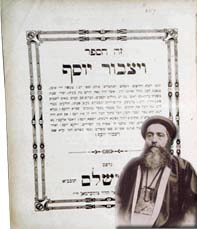 My grandfather Abraham-Albert, to whom I dedicated a book ( The Jewish little Pasha of Jerusalem"’L'Homme du Sérail, NiL, 1996) and a Memorandum of the Ecole des Hautes Etudes, with a huge bibliography – was himself the grandson of the very well-known Jacob Antébi (1774-1846), unwilling hero of the Damascus Case (1840), the basis for many books, like Rome Jerusalem by Moïse Hess – at the origin (with the Mortara case of a Jewish child, converted to Catholicism by a maid, kidnapped, and who became eventually a canon in Rome) of Alliance israélite universelle in 1860. It was out of one of these legends invented and spread by Christian convents, from the Middle-Age on, that the myth began of Jews using the blood of a child to knead their Easter bread – all that despite the ritual taboos on blood: The French consul, Ratti Menton, was involved in the origin of the scandal, having related a tale about a Franciscan brother, Father Thomas, who was killed in the Jewish area, with his Arab servant, and ‘whose bones had been found’ (in the end, they discovered that they were the bones of a dog). Around ten Jews were put into jail and tortured, one of them being the chief rabbi Jacob. Luckily, the Austrian consul in France, James de Rothschild, read the report, one of the Jews being an Austrian protégé. A delegation with A. Crémieux and Sir Moise Montefiore obtained the release of the defendants. Once free, Jacob went to Jerusalem, where he died six years later, leaving a young woman pregnant with Joseph. My grandfather Abraham-Albert, to whom I dedicated a book ( The Jewish little Pasha of Jerusalem"’L'Homme du Sérail, NiL, 1996) and a Memorandum of the Ecole des Hautes Etudes, with a huge bibliography – was himself the grandson of the very well-known Jacob Antébi (1774-1846), unwilling hero of the Damascus Case (1840), the basis for many books, like Rome Jerusalem by Moïse Hess – at the origin (with the Mortara case of a Jewish child, converted to Catholicism by a maid, kidnapped, and who became eventually a canon in Rome) of Alliance israélite universelle in 1860. It was out of one of these legends invented and spread by Christian convents, from the Middle-Age on, that the myth began of Jews using the blood of a child to knead their Easter bread – all that despite the ritual taboos on blood: The French consul, Ratti Menton, was involved in the origin of the scandal, having related a tale about a Franciscan brother, Father Thomas, who was killed in the Jewish area, with his Arab servant, and ‘whose bones had been found’ (in the end, they discovered that they were the bones of a dog). Around ten Jews were put into jail and tortured, one of them being the chief rabbi Jacob. Luckily, the Austrian consul in France, James de Rothschild, read the report, one of the Jews being an Austrian protégé. A delegation with A. Crémieux and Sir Moise Montefiore obtained the release of the defendants. Once free, Jacob went to Jerusalem, where he died six years later, leaving a young woman pregnant with Joseph.
Joseph (1846-1919), the father of Abraham-Albert, with, behind him, one of the pages of his book of Sermons and Funeral orations. 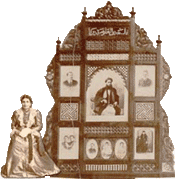
Esther Catran, with the wig for pious women, before the mother-of-pearl and wood furniture (a Damascus speciality) with the photos of her husband and children. Esther was from the Totah and Catran families.
The son of Jacob and father of Albert, Joseph, had married his cousin, Esther Catran. They lived in the Jewish area of Damascus, southeast of the city. Joseph and Esther had many children; the eldest, David, born in 1862, was the first of them to leave to Egypt, with his wife Fahrida, who took with her, on the donkey, ten brooms or more, so convinced she was that she was going to a savage country!
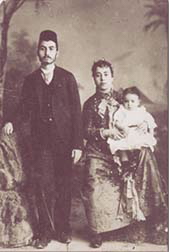 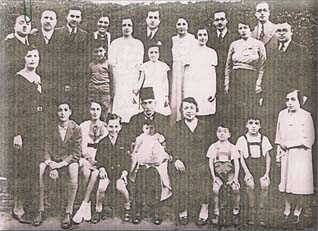
On the left, David and Fahrida departing for Egypt.
On the right, David and his wife, at Cairo, with their children and grandchildren
Joseph and Esther followed them and Joseph became one of the most respected (and dreaded) rabbis of Cairo.
Their children were, besides the eldest, David (1862-1934) with his six children (Joseph, Jacques, Esther, Michel, Salomon et Moïse) and Albert-Abraham (1873-1919) with his eight children, Elie (1878-1941) married to Caroline Benchimol with whom he had three children (Camille, Yvette, Armand), Lea (1880-1907), married to Smadja - they had one daughter, Adèle, who was orphaned very young; Rébecca (1881-1920) who married rabbi Bigio and had seven children (Désiré, Lucien, Esther, Joseph, Marcel, Victor, Samy) and Raphaël (1882-1941), married to his mother’s niece, Rebecca Catran; they had seven children (Joseph, Esther, Odette, Simon, André, Violette, Myriam). According to a legend in the family, there was an elder daughter, Boulissa, but she was kidnapped by one of those brigands of whom there were many at the time. And nobody ever saw her again.
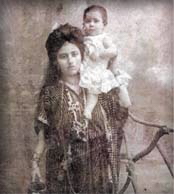 One of the daughters of Joseph and Esther, Rébecca, One of the daughters of Joseph and Esther, Rébecca,
And the younger brother, very dear to Albert, Elie, Principal of the Menasce School of Alexandria.

 Abraham-Albert (1873-1919), became, very young, the principal of the school of the Alliance israélite universelle in Jérusalem, and was one of the most important go-betweens for buying property in the Holy Land, representating the settlers of the Rothschild settlements in the Ottoman Palestine, and becoming the favourite negotiating agent of the Arab families – Husseini, Nashashibi, Khalidi and so on. Sent to the front line of Caucasus, in 1917, he knew a certain General Mustapha Kemal. He died at 45, of typhus, in Constantinople, in the middle of directing a huge rescue operation - what we might call today the humanitarian coordination of the repatriation of refugees of any religion and origin. Abraham-Albert (1873-1919), became, very young, the principal of the school of the Alliance israélite universelle in Jérusalem, and was one of the most important go-betweens for buying property in the Holy Land, representating the settlers of the Rothschild settlements in the Ottoman Palestine, and becoming the favourite negotiating agent of the Arab families – Husseini, Nashashibi, Khalidi and so on. Sent to the front line of Caucasus, in 1917, he knew a certain General Mustapha Kemal. He died at 45, of typhus, in Constantinople, in the middle of directing a huge rescue operation - what we might call today the humanitarian coordination of the repatriation of refugees of any religion and origin.
|



